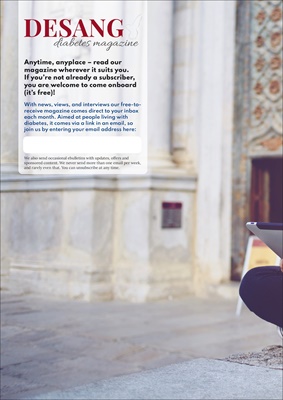
20
KIT
Streets ahead
Tim Street runs experiments on himself, why? By
Sue Marshall
I
would argue that anyone taking
insulin is running some sort of
test on themselves on a daily,
hourly basis. That is not a
clinical trial, as it's not under clinical
conditions, i.e. being observed in
clinic. However, it's the nature of
living with diabetes that some trials
have to also take into account doing
trials that take place in the normal
home environment. For example,
the early days of insulin pump trails
always take place in a clinic, later
trials took place in peoples' homes.
Afterall, pumps had to work 'out in
the wild' with real people living their
real lives.
Tim Street (along with some others),
regularly do 'experiments' on
themselves. He is famous for having
put five different CGM sensors on
himself, and tracked the results.
That's just one of his undertakings.
He makes no bones about the fact
that it's just himself, in fact he
has branded what he does as n=1,
where the 'n' stands for 'number of
participants'.
I've known him for years but this is
the first time I've directly asked him,
why? Here's what he told me:
"I've been undertaking n=1
experimentation for a while. It all
started when I ended up with two
Libre sensors [the first generation]
and their readers. I was suspicious
that the sensor-to-sensor variation
was quite high, so I ran two side by
side, which I'd not seen anyone else
doing, to see whether my suspicions
were correct. It turned out that they
were."
Patterns and data
He continues, "That really set the
pattern for all of the n=1 things that
I've done. I've either read studies
that indicate that something should
happen or be effective, or had
discussions with people that suggest
something. So, where it might be
useful to both me and others, I
take a hypothesis and then set out
to discover if it's true. If it involves
anything associated with insulin
or drugs, then I'll do a significant
amount of research into interactions
and safety before making a decision
to do anything. I don't want to put
myself at any significant risk.
"I'm very comfortable with managing
and using data, as it's part of my
paid work. Taking diabetes data
and messing around with it is
just that - messing around and/
or a bit of fun, but with a serious
endpoint. Generally, I find getting the
messages out of the data a relatively
straightforward task, and if there's
something I don't know how to do,
then Google is generally very helpful.
"As is often stated in the Type
1 community, living with the
condition is one big, lifelong, science
experiment. In general, the stuff I'm
doing often starts off with the idea
that it will help with my own diabetes
management, either by improving
time in range (TIR) or making it
easier to live with. Sometimes it's also
about adding to the wider debate,
like the n=1 CGM comparisons. These
are intended to raise questions about
the veracity of vendor claims and
make potential users think about the
devices they are being presented
with.
"Ultimately, it's all about answering
questions to which I've been unable
to find clear answers, either to help
myself, or to add to the body of
available knowledge for others to go
through."
A holiday, from T1D?
True to style, even when he is on his
holibobs, Street sees that as another
opportunity to see how a trip of a
lifetime affects his control. Indeed,